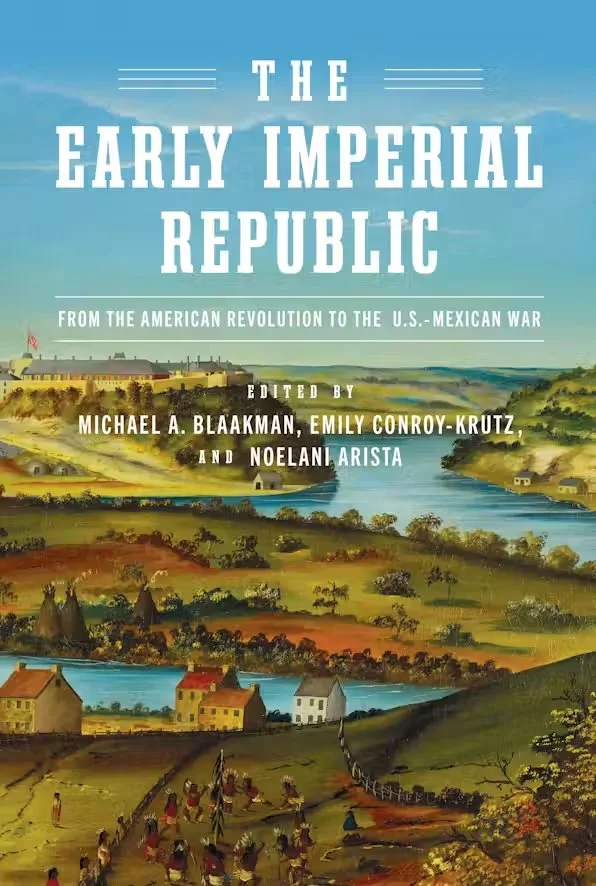Recent Publications
-

"Sources and U. S. Citizenship in the Antebellum United States: A View from Abroad" Law & History Review 42 no. 3 (Aug., 2024): 649-658.
This article republishes a series of documents concerning citizenship rights for African Americans who were abroad. Twice during the 1850s the U.S. Secretary of State (William L. Marcy) issued instructions to consuls where he spelled out the relationship between race and citizenship for individuals who were beyond the borders of the United States. Because citizenship was not clearly defined the antebellum period, either in law or practice, the Secretary's guidance offers an important set of documents that scholars from a variety of fields can incorporate into their scholarship and teaching.
-

"Freedom in Chains: U.S. Empire and the Illegal Slave Trade" in The Early Imperial Republic: From the American Revolution to the U.S.-Mexican War ed. Michael Blakeman, Emily Conroy-Krutz, and Noelani Arista (Philadelphia: University of Pennsylvania Press, 2023): 179-201.
Whereas historians often talk about the expansion of the U.S. Slave Empire in national terms, this chapter shows the international and diasporic dimensions of slavery’s growth in the United Staten. It does this by exploring the kidnapping of apprentices from Barbados into Texas. Centering one case from 1835, it traces how the end of slavery in the British Caribbean triggered forced migrations into the nearby plantation sector in the U.S. South.
-

"Abolishing Slavery in Motion: Foreign Captivity and International Abolitionism in the Early United States” William and Mary Quarterly 77 no. 2 (April, 2020): 246-72.
During the late eighteenth century, servants, apprentices, and free people of African descent were taken into captivity in one nation and enslaved in another. Abolishing this kind of international slavery in motion comprised an element of the antislavery agenda for abolitionists in the United States. Existing work on the early antislavery movement has focused largely within national contexts and on abolitionists’ dogged attempts to abolish the institution of slavery. Yet abolitionists had to create cosmopolitan antislavery strategies to dismantle the kinds of coerced mobility that rendered people enslaved in foreign realms. Captives and their abolitionist allies worked to make freedom papers a key part of antislavery law. Scholars have ably shown that freedom papers could be protectors of liberty, and examining attempts to eradicate slavery in motion helps to unpack why and how documents acquired important power. Crafting antislavery law and politics to end the coerced mobility of servants, apprentices, and free people in the wider Atlantic world fit within a broad antislavery agenda in the early United States.
Full List of Publications
Monograph:
The Alchemy of Slavery: Human Bondage and Emancipation in the Illinois Country, 1730-1865. Philadelphia: University of Pennsylvania Press, 2018.
(Reviews included in: American Historical Review, Journal of American History, Reviews in American History, Journal of the Early Republic, Slavery & Abolition, Eighteenth Century Studies, Journal of American Studies, Journal of the Civil War Era)
Peer-Reviewed Articles and Book Chapters:
“Birthright or Citizenship: Tutelage, Consular Protection, and Race in the U.S. Empire Before the Civil War” Journal of American History (forthcoming, 2025).
"Freedom in Chains: U.S. Empire and the Illegal Slave Trade" in The Early Imperial Republic: From the American Revolution to the U.S.-Mexican War ed. Michael Blakeman, Emily Conroy-Krutz, and Noelani Arista (Philadelphia: University of Pennsylvania Press, 2023): 179-201.
"Abolishing Slavery in Motion: Foreign Captivity and International Abolitionism in the Early United States” William and Mary Quarterly 77 no. 2 (April, 2020): 246-72.
“Black Migration, Black Villages, and Black Emancipation in Antebellum Illinois” in Emancipations, Revolutions, Reconstructions: Black Politics in the Long Nineteenth Century ed. David Waldstreicher and Van Gosse (Philadelphia: University of Pennsylvania Press, 2020): 102-115.
“‘Reducing Freedmen to Slavery': Black Kidnapping and the Politics of Abolition in Antebellum Illinois,” Journal of the Early Republic 38 no. 2 (Summer 2018): 261-91.
“Beyond Plantations: Indian and African Slavery in the Illinois Country, 1720-1780,” Slavery and Abolition 38 no. 3 (Sept., 2017): 489-509.
“In A State of Slavery: Black Servitude and the Limits of Legal Emancipation” Early American Studies 14 no.1 (Winter 2016): 114-39.
“’That A’Cursed Illinois Venture’: Slavery and Revolution in Atlantic Illinois,” Journal of Illinois History 13 no. 2 (Summer 2010): 107-28.
Edited Works:
Guest editor with Michael Bernath, "Cracks in the Foundation: The Fourteenth Amendment and its Limits,” introduction to special issue of the Journal of the Civil War Era 10 no. 2 (March 2020): 1-4.
“Sources and Citizenship in the Antebellum U.S.: A View from Abroad” Law & History Review (Published online February 17, 2025).